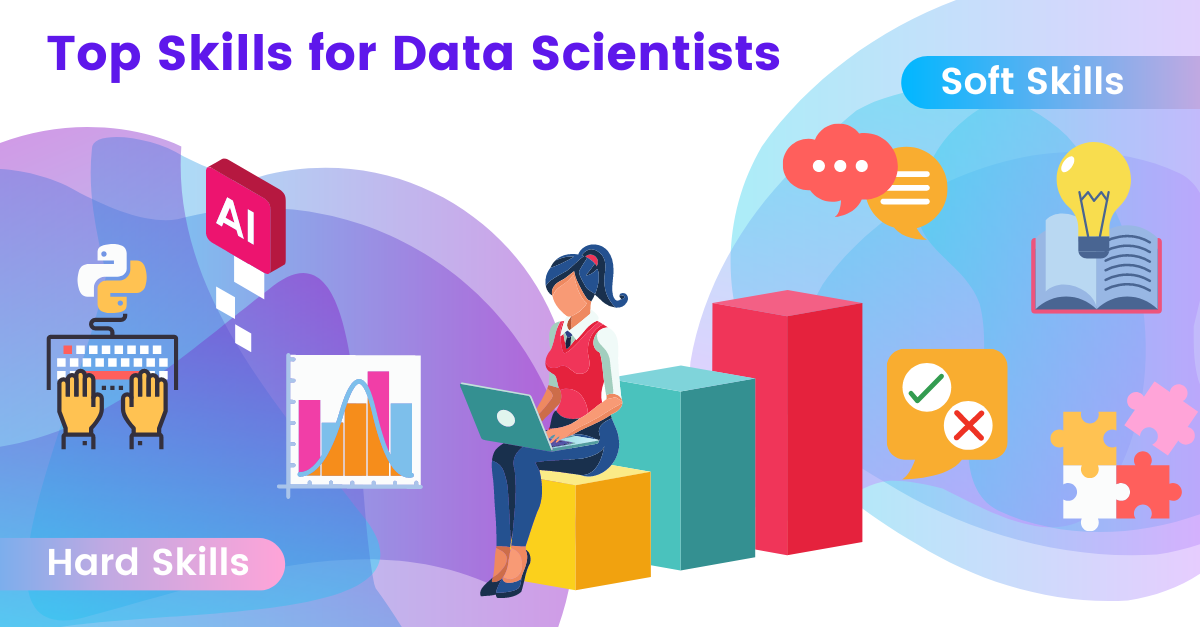Data Science consists of many sub-disciplines. Data analytics, programming, artificial intelligence and machine learning are just a few of them. This is particularly due to the fact that this field must always be able to adapt to the latest technologies and standards.
The fact that Data Scientists have to master many disciplines is also reflected in their above-average Salary and career opportunities again. StackFuel graduates report a steep learning curve. So if you still have doubts about whether you can qualify for the field of data science, we can reassure you. All the data scientist skills you need for the job can be learned. Here you can find a Field report From StackFuel alum Alex.
By the way: Thanks to Education voucher you can even get further training in data science free of charge under certain conditions.

But data science consists of much more than just hard skills. Customer contact, project management or creativity are also highly valued as Data Scientist skills. But why does a Data Scientist need to cover so many different skills? As a Data Scientist, you are involved in almost all process steps of a data project. It is therefore hardly surprising that a Data Scientist needs to have a wide range of skills.
This blog article is exciting for you if you are considering becoming a Data Scientist, as well as if you are already working in a data profession and want to stay up to date on trends and developments in your field. In the following, we give you an overview of the five most important Data Scientist skills you should have to be successful in a data job.

The Hard Skills of a Data Scientist
Hard skills are technical qualifications typical of the profession. For Data Scientists, these skills are necessary to perform their job. Your skills in the area of mathematics form the basis for this. Let's take a closer look at these.
1 Mathematical skills
Your math teacher was right after all, but don't worry, a job as a Data Scientist is not a math exam. Mathematics is the most important basis for generating added value from your data. Using learnable, mathematical skills, you analyze data, write algorithms, and validate results. The following three areas of mathematics are particularly relevant for you:
- Statistics
- linear algebra
- Analysis
But let's get more specific. Which terms and areas of mathematics should you be able to explain and apply off the top of your head as a finished data scientist?
- Mean, median, mode
- Standard deviation, mean absolute deviation from median
- Variance, interquartile range
- Normal distribution, histogram, box plot
- Correlation, covariance
- Multiplication, transposition of a matrix or a vector
- Determinant and inversion of a matrix
- Eigenvalues, eigenvectors and singular values of a matrix
- Derivatives, gradient, chain rule, product rule
- Zeros, extreme values, saddle points
- Statistical testing, p-test, t-test, AB-test
- Gradient method, convergence, divergence
- Classification, Regression
- Bayes Theorem
- Linear regression, logistic regression, decision tree
- Random Forest, Support Vector Machine, neural network
- Principal component analysis, singular value decomposition
- Hit accuracy, relevance, sensitivity, F-measure
- Euclidean distance, p-norm
- Coefficient of determination (R² - value)
Maybe you are thinking "Whew, what a long list". But we can reassure you. Behind all these terms are clear principles that only need to be learned and understood once. To support learners in this process, experienced Data Scientists mentor them in StackFuel trainings and ensure their learning progress at all times.
In general, Data Science is a very mathematics-heavy field. As a Data Scientist, the above list is your basic knowledge and tools for working with data. In addition to mathematical skills, programming skills are also among the hard skills that facilitate and accompany your everyday work.
2 Programming skills
Enormous amounts of data and the complexity of modern algorithms make the use of software essential for any Data Scientist. Without it, you would not be able to process and analyze the data in such a way as to recognize patterns in it and make them useful.
Besides a rough understanding of the hardware of a computer (CPU, GPU or RAM), the joy of programming helps you as a Data Scientist. You don't have to be pale or unable to get out of the basement. Programming can and should be fun.
Imagine that you are learning a new language that will help you write programs that can do pretty cool things for you. For example, you can use Python automate whole steps and let your program take over boring tasks. In almost all cases it is sufficient to know Python 3. Less often it can be important to learn C, Scala or Julia programming.
If these reasons are not enough for you to learn Python, here are three more for you:
- Python is very easy to learn and program.
- That is why Python is considered the most popular programming language by programmers worldwide (as of June 2022). Because of this popularity, there exists a large community that makes Python more and more powerful and supports you in case of difficulties in programming.
- There are also a huge number of Python libraries that are extremely useful for Data Scientists.
These Python libraries will help you in your work as a Data Scientist in the following subsections:
The best Python libraries for data processing:
- Numpy
- Pandas
- PySpark
The best Python libraries for machine learning:
- Scikit-learn
- TensorFlow and Keras
- PyTorch
The best Python libraries for data visualization:
- Matplotlib
- Plotly
- Seaborn
Similar to math skills, this list is your friend and constant companion on the job. But also have the courage to deviate from this list. As a Data Scientist, you can never know enough! Always learning, discovering and trying new things is a big factor why Data Science jobs are so popular.
Is your head already spinning with lists? We know that these are a lot of skills that you need to master for the job as a Data Scientist. You'll use mathematics and programming regularly in your day-to-day work so that you can complete projects successfully. But they are not everything.
Below we show you what data scientist skills you need to implement processes.
3 Process management
To successfully manage projects and get the most out of your data, you'll need extensive data scientist skills for data preparation, building machine learning models, or writing SQLs for databases, among other things.
We'll show you exactly which ones they are:
Data preparation:
- Categorical data coding
- Feature Engineering
- Dealing with missing values
Machine Learning:
- Overfitting and underfitting
- Hyperparameter optimization
- Selection of algorithms depending on the situation
Databases:
- Writing SQL Queries
- Connecting relational tables
- Use of structured and unstructured data
Provision:
- Integration of algorithms in IT infrastructures
- Cloud computing
- Continuous Deployment
But if technical skills alone are enough, a computer alone could do the job. Your soft skills round out your technical competencies and make you indispensable to companies. The following soft skills make you really valuable and popular as a Data Scientist.

The soft skills of a Data Scientist
Many underestimate soft skills as the basis for the work of a Data Scientist. These often determine the success of the briefing, the implementation, and the project completion. You must be able to communicate with colleagues, customers, or decision-makers in a way that is appropriate for the target group and to integrate their wishes into your planning and processes. You must always consider what information your counterpart has and needs to understand the big picture.
Above all, this means that you need to develop a deep domain understanding. As a Data Scientist, you are the link between product, business and abstract technology. Your first priority should therefore be your communication skills - or in data science terms: data storytelling.
4 Data Storytelling
Data Storytelling is a collection of different techniques and methods to communicate complex, data-driven results to non-experts. As a Data Scientist, you use insights from the cognitive sciences.
On the one hand, it's about creating a story - the data story - from your data. Stories are easy to digest and stick in the listener's mind. On the other hand, explanatory visualizations play a major role. These are graphs that use colors and shapes to draw the viewer's attention to the important message.
They allow you as a Data Scientist to mediate between subject matter experts and decision makers. Unfortunately, data storytelling is a neglected skill that is difficult to acquire without support. In general, soft skills require a lot of experience or the right mentoring by experienced Data Scientists.
In addition to data storytelling, project management skills are also of great importance. In particular, agile project work has become established in data science projects.
5 Agile work
The methodology of agile working is based on various best practices that have been collected over the years. Agile working has its origins in software development. In practice, this means delivering products quickly and developing them further in iterative feedback loops. This means that companies no longer launch a finished perfect product on the market, but often first a beta version, which is then tested and optimized.
In data science projects, it is often impossible to predict what challenges you will face and whether the planned solutions are feasible. This unpredictability, which data scientists must be able to deal with, is the reason why agile working has become established.
Conclusion: These skills make for successful Data Scientists
In this article, you've learned the five data scientist skills you'll need on the job. Some of them you'll have to build up yourself over the course of your career, while others you'll learn best from those who have already mastered them. That's why in our Advanced training as Data Scientist Focus Python on experienced Data Scientists who accompany you in live webinars during the training and ensure your learning success.
These are the top five data scientist skills you need for a career in data science. We hope this blog article has given you some new insights. Above all, one skill is especially important for your profession and that is having fun at work. Especially nowadays, when nobody has to stay in a job he/she doesn't like and skills are so easy to find. already learnable for 0€ are, it is up to you in which job you would like to work.
If you are considering a job in data or tech as your dream job, we will be happy to advise you personally in a 15-minute meeting and help you assess which job could be suitable for you and what skills you need for it.
Learn everything you need for your job in StackFuel's Data Science online training.





